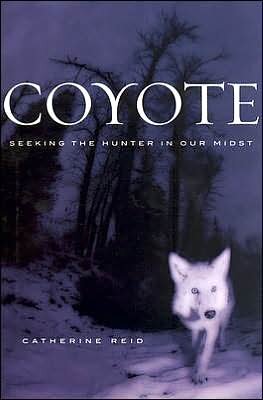Coyote: Seeking the Hunter in Our Midst
Houghton Mifflin Harcourt 2004; Mariner Books 2005.
“When Catherine Reid returned to the Berkshires to live after decades away, she became fascinated by another recent arrival: the eastern coyote. This tenacious species, which shares some lineage with the wolf, exhibits remarkable adaptability and awe-inspiring survival skills. Coyotes have been spotted in nearly every habitable area available, including urban streets, Central Park, and suburban backyards. Settling into an old farmhouse with her partner, Reid felt compelled to learn more about this outlaw animal. Her beautifully grounded memoir interweaves personal and natural history to comment on one of the most dramatic wildlife stories of our time. With great appreciation for this scrappy outsider and the ecological concerns its presence brings to light, Reid suggests that we all need to forge a new relationship with this uncannily intelligent species in our midst.” —Mariner Books
Blurbs and reviews
“Catherine Reid’s search for the Eastern coyote leads to all the larger questions of our human place in the world — our inextricable bonds with the wild, and our separateness from it. She grants these questions their complexity and difficulty, and does so in graceful, intimate, and vibrant prose. Coyote is an important, beautiful book.” —Jane Brox, author of Clearing Land and Five Thousand Days Like This One
“A biologist friend once told me, ‘When the last human dies, there will be a coyote howling over his grave.’ This beautifully written book explains why that would be a fine eulogy indeed, from a creature as resourceful and as resilient as ourselves, and maybe even more adaptable.” —Bill McKibben, author of Enough: Staying Human in an Engineered Age and The End of Nature
“Alive with terror, charm, and mystery.” —Madeleine Blais, author of Uphill Walkers
“More than a book about nature, Coyote is also a narrative about home and family, and about human attitudes toward the wild and the unfamiliar.” —David Mehegan, Boston Globe
“Editor’s Choice” —Boston Herald
“Good essayists, like coyotes, cruise for morsels and linger where advantage lies. Reid’s story would seem less profound were she to have laid facts out in a straight line. An essayist takes what’s known and, by creating context, gives old knowledge fresh purchase. Time and again, Reid uses literature as fuel for her pursuit of the coyote. We hear her thinking aloud, unhurried by fact, pushing on. The book rises on the draft of her own wondering. Ultimately, Coyote is a multifaceted book that, after it unspools its understanding about the coyote, concerns a sense of place. Reid expands her terrain by letting the book’s place be her places.” —Hampshire Gazette
“Like the coyote, Catherine Reid recently moved into New England, where she patiently studied this creature out of folklore… Her book, Coyote: Seeking the Hunter in Our Midst, recounts her fascination, and passes along the kind of information that makes the coyote come alive as part of our area’s changing ecological picture… Coyote tells us a great deal about our new neighbors—that they’re bigger than their western counterparts, for example, and that they represent serious threats to pets and even toddlers—but this information is wrapped in a kind of memoir, like a gift sitting in bubble wrap.” —Providence Journal
“Reid … offers enlightening passages about coyote communication, transformations in her local landscape and the concept of interspecies ‘mutualism,’ while making a heartfelt, often poetic case for coexistence between humans and the wild, however red in tooth and claw.” —Publishers Weekly © Reed Business Information, a division of Reed Elsevier Inc.
“Written in a lyrical style that reveals her background in poetry, and concluding with a large bibliography, [Coyote] is a captivating read and worthy of joining the pantheon of literary ecological writing.” —Nancy Bent © American Library Association.
“An appreciative piece of literary natural history'” —Kirkus Reviews

